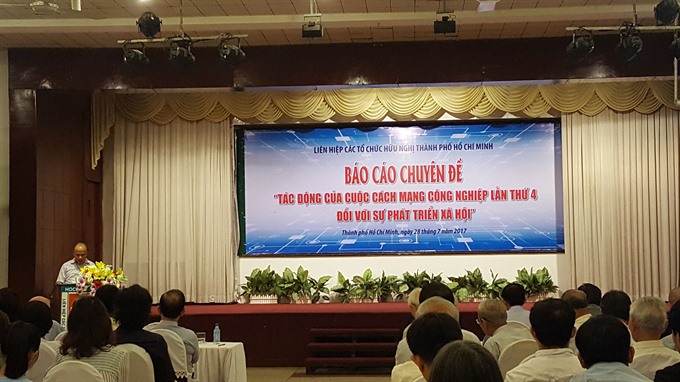 Economy
Economy

" />The Fourth Industrial Revolution will create great challenges but also opportunities for Việt Nam to take off, a seminar heard in HCM City on Sunday.
 |
HCM CITY – The Fourth Industrial Revolution will create great challenges but also opportunities for Việt Nam to take off, a seminar heard in HCM City on Sunday.
Speaking at the seminar titled “Effects of the Fourth Industrial Revolution on Socio-Economic Development,” Tống Viết Trung, deputy general director of Viettel Group, said: “[It] will usher in smart production where there will be no need for workers to control machines. There will be very high technology integration and value chains with very high connectivity and great flexibility to cope with rapid changes in demand.”
"At the core of the Fourth Industrial Revolution is integration of new technologies based on the internet, all environment-friendly, energy-saving, and less or not polluting," he said.
"The revolution is just beginning and it will have some initial effects," he said.
Emerging economies would renovate extensively and encourage renovation and creativity to catch up with developed nations, he explained.
“The development model based on natural resources and low-cost workers will change to one based on technology renovation and creativity.”
For instance, the cost of a robot had halved since 1999, he said. A US$20,000 robot could assemble 30,000 Iphones a year, meaning assembling a phone would only cost 66 cents, a very low cost that no worker could match, he said.
Traditionally, production lines were located in China and other developing countries with low-cost labour, but now, with smart robot and 3D printing, they would move back to developed nations to be close to customers and quickly meet changing demands, he said.
“It means the Revolution might change the mindset of investment and production from low-cost labour to big markets and technology.”
In the future workers are expected to be replaced by robots. The World Economic Forum predicts that between now and 2020 technology will cause the loss of 7.1 million jobs.
The International Labour Organization warns that 56 per cent of jobs in Southeast Asia will disappear in the next two decades.
Challenges
“There is no doubt that Việt Nam will face great challenges during the Fourth Industrial Revolution,” Trung said.
Artificial intelligence, virtual reality technology and robotics might cause multinationals to move their plants back to developed nations and Việt Nam would find it hard to become the new workshop of the world and face higher unemployment and socio-economic instability, he said.
The use of technology to recycle and save energy and in transport (like Uber, electric cars) would also reduce the country’s advantages in the form of natural resources like oil, coal and hydropower, he said.
“The revolution will require more ‘talented’ workers who can adapt to technology rather than traditional ‘skilled’ workers. Manual workers will face many disadvantages.”
"Việt Nam has abundant labour but of limited quality and low capacity," he said.
In 2012 the comparable efficiency of a Singaporean worker was 14.5 times higher, while it was 8.5 times in Japan, seven times in South Korea, and 2.9 times in Thailand, he said.
“In the long term labour-intensive industries like garment and assembling in Việt Nam will face risks.”
Importantly, the revolution would occur rapidly compared with previous ones, he said: “It would need only 10 – 20 years to significantly change all society.”
Opportunities
The adoption of digital technologies would increase transparency and efficiency and improve public administration, which is currently thought to be cumbersome and inefficient, he said.
Every economic entity, whether private, small, medium-sized or start-ups, would benefit from the improvement in public administration, he said.
Other areas such as education, healthcare, entertainment, transport, and agriculture would see quality improved thanks to technology, he said.
The availability of super-connections would allow people and machines to link up and enable a boom in cross-border services, he predicted.
“Small and medium-sized Vietnamese enterprises would become cross-border service providers and directly compete with the biggest multinational corporations, creating new business models that can lead the market in a very short time.
“Humans will return to and enjoy history, culture and nature. This is a good chance for Việt Nam to develop tourism.
“Challenges are also opportunities for Việt Nam to dramatically renovate its education and training to develop quality human resources.”
Role of Government
Assoc Prof Vũ Minh Khương of the National University of Singapore’s Lee Kuan Yew School of Public Policy, said, “The role of the Government in the revolution is very important.”
The Government must adopt strategies to adapt to the revolution based on international integration, recognise weaknesses and strengths and identify priorities to significantly change the economy, he said.
The seminar was organised by the HCM City Union of Friendship Organisations - VNS









